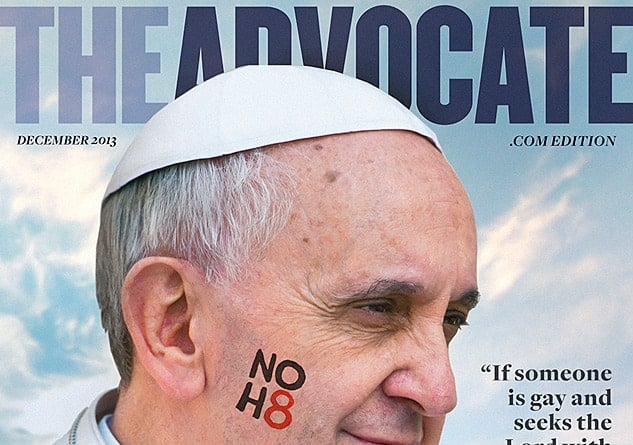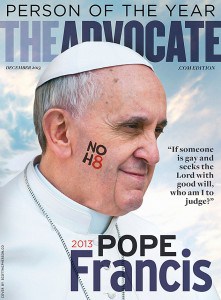On the list of things I never expected, Pope Francis’s selection as The Advocate’s Person of the Year ranks right near the top. They researched Pope Francis and they knew and understood his public statements both from the past year as well as his work in Argentina. This was not satire. I slid back into my chair and stared at the screen. Why aren’t they angry? Shouldn’t The Advocate be denouncing the Church?
If the explosion of denunciations, ad hominem attacks and shouting in the comments section are any indication, I wasn’t the only one who had expected something different from The Advocate.1 But The Advocate didn’t give us denunciations, shouting or ad hominem attacks. So what were they trying to say — especially since they clearly haven’t convinced a vocal portion of their regular readership? I think they were sending a message to Pope Francis and the rest of the Roman Catholic Church, in effect saying: we’ve heard the change in tone and we want you to know that we think it makes a difference. They were providing a clear witness.
Many Advocate readers couldn’t have imagined Francis as the Man of the Year (nor could I); they had trouble imagining a way for the LGBT community to speak about him without denouncing him. Many wanted denunciations and instead The Advocate gave them a message of hope. After a few minutes of stunned silence, I started to grin. I’ve seen this before! I’ve watched this same reaction unfold in Catholic circles across the web for an entire year, especially about abortion, contraception, and same sex marriage. The culture warriors wanted denunciations of positions contrary to Church teaching, and instead Francis gave them a message of hope.
The Advocate is well aware that Pope Francis has not suddenly reversed course on the Church’s teaching and is honest about the tensions and serious work that await us all. They have been in this struggle for decades, and they bear the scars of that battle.
There’s a lot of disagreement, about the role of women, about contraception, and more. But none of that should lead us to underestimate any pope’s capacity for persuading hearts and minds in opening to LGBT people, and not only in the U.S. but globally.
The remaining holdouts for LGBT acceptance in religion, the ones who block progress in the work left to do, will more likely be persuaded by a figure they know.
Yet rather than let the struggle drive them away from hope and dialogue, The Advocate quotes Equally Blessed:
Pope Francis did not articulate a change in the church’s teaching today, but he spoke compassionately, and in doing so, he has encouraged an already lively conversation that may one day make it possible for the church to fully embrace gay and lesbian Catholics.
There is so much healing that could happen in the coming conversations. The important and challenging thing about true dialogue is that both participants learn something they didn’t know before, and the final conclusion can’t be predicted in advance by either side. Pope Francis’s refusal to judge doesn’t mean that he’s moving towards changing Church teaching, and The Advocate putting Francis on the cover doesn’t mean that they’re suddenly going to embrace all that the Church calls for — but the fact that both are interested in the conversation is already a sign of hope. In fact, it’s a hope that Francis has already pointed to, in his call for dialogue in his recent exhortation:
In a culture which privileges dialogue as a form of encounter, it is time to devise a means for building consensus and agreement while seeking the goal of a just, responsive and inclusive society. The principal author, the historic subject of this process, is the people as a whole and their culture, and not a single class, minority, group or elite. We do not need plans drawn up by a few for the few, or an enlightened or outspoken minority which claims to speak for everyone. It is about agreeing to live together, a social and cultural pact.
— Evangelii Gaudium §239
As TJP has argued before, there is something to be learned from the fact that denunciations are less credible — by far — than images of rejoicing and gladness. If we want dialogue, no matter what conclusion we expect it to reach, then at a minimum we have to refrain from denouncing those with whom we hope to speak. And in an irony that stings as much as it makes me laugh, when any of us enter a debate and feel that tug to denounce, we’ve just discovered a dangerous temptation we all share, no matter what side of the issue we take. The Advocate gave us a powerful example of how to move beyond simplistic denunciations. The temptation facing the Church now is to respond with an obsessive clarification of the established teaching, with which, as we’ve seen, even people who disagree are already familiar. Instead, I hope and pray that the everyone who speaks for the Church can respond to an invitation to dialogue in kind, demonstrating that same hope, love, and charity, and a little bit of patience, waiting to see where it leads us all.
— — —
- PSA: Reading a comment section on an article related to culture wars is always a harrowing experience. Proceed with extreme caution. ↩



